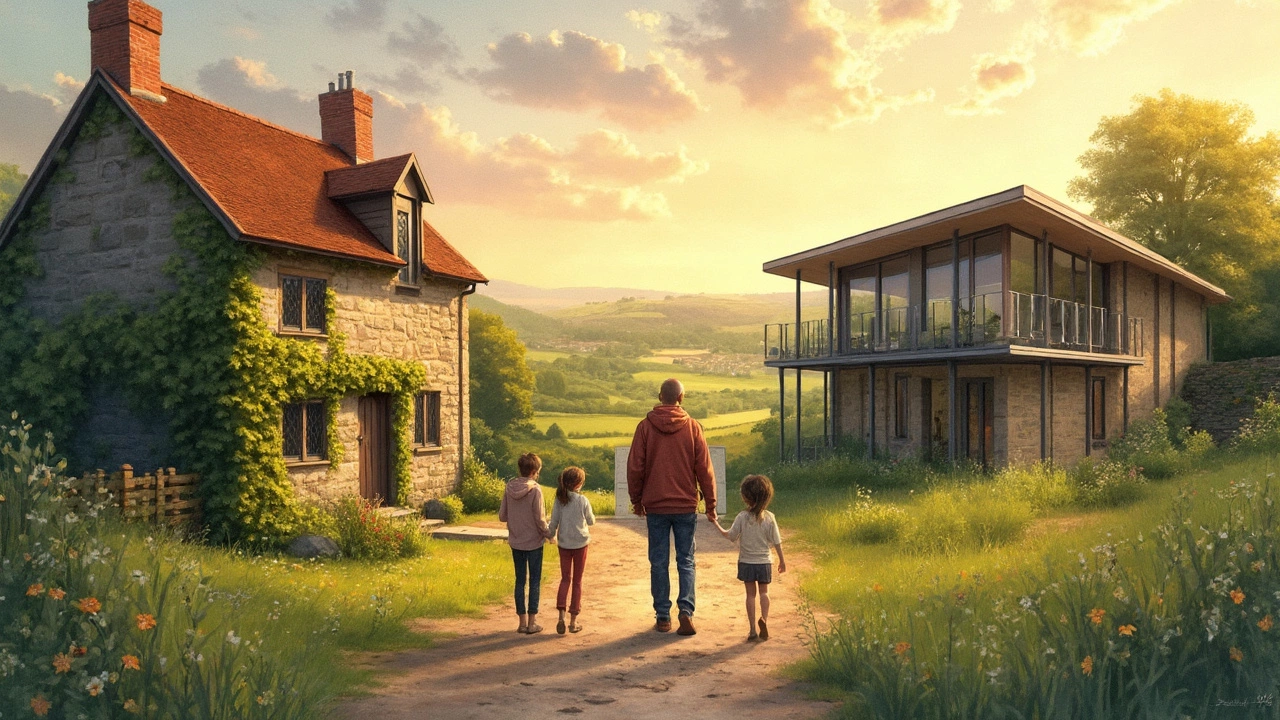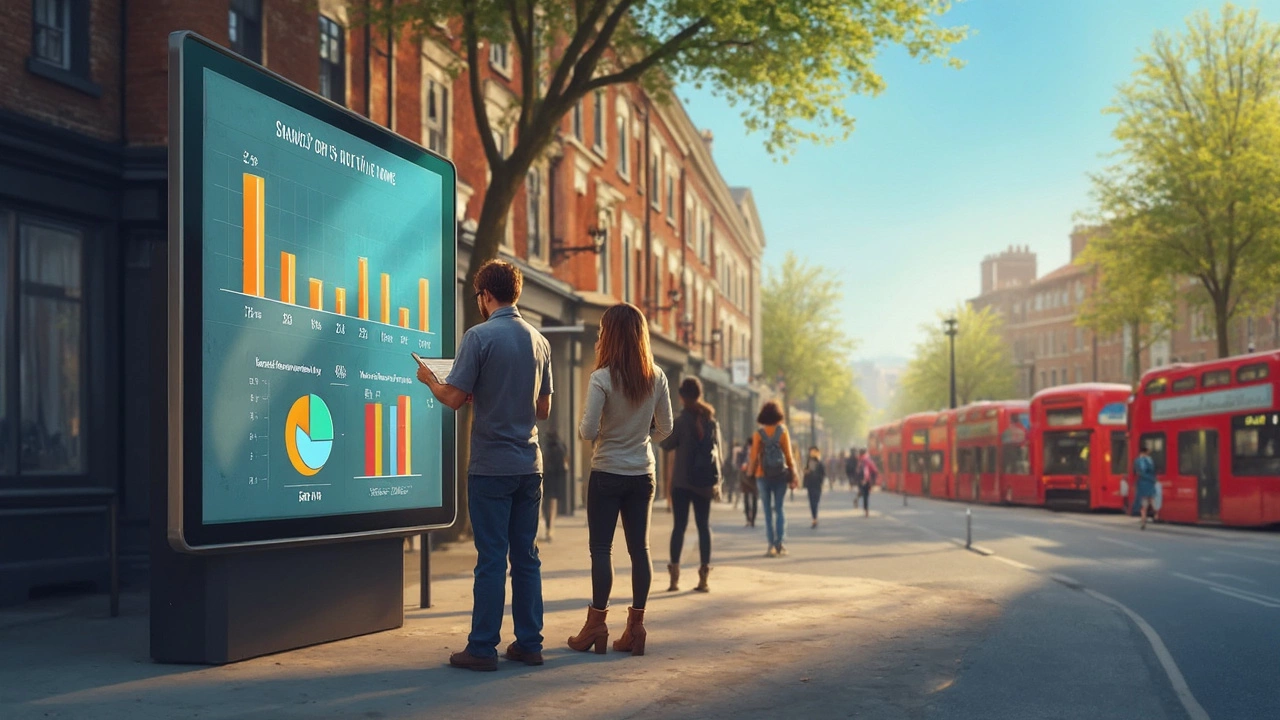Buy or Build: What's Smarter for Your New Home?
 Apr, 11 2025
Apr, 11 2025
So, you're thinking about a new house. It's exciting, right? But here's the big question: should you buy an existing home or start from scratch and build one? Both options have their perks, and it's not just about bricks and cement—it's your future we're talking about here.
Buying a house means you get to pack your bags and move in fairly quickly. No hammers, no nails—just the logistics of financing and a bit of paperwork. Plus, it's a lot easier to predict costs, which is a huge relief for your wallet.
On the other hand, building a house lets you call the shots every step of the way. You get to decide what your kitchen will look like, choose the fancy tiles for your bathroom, and even decide how many power outlets you need (you can never have too many). It's like picking bits of a dream house from a catalog, but let's not kid ourselves—it can take a chunk of time and a fair bit of patience before you see the final product.
Cost Considerations
Alright, let's talk numbers. Deciding whether to buy a house or build a house usually boils down to dollars and cents. When you're buying, it's pretty straightforward—you pay what's on the sticker and maybe haggle a bit. But hold on, building is a different ball game.
First off, buying an existing home often comes with invisible perks. Picture this: the landscaping is done, there's already a driveway, and hopefully, no nasty surprises in the plumbing or roof. These are things you usually pay extra for when you start building from scratch. And let’s be honest, unexpected repairs can hit you like a surprise birthday party, minus the fun.
On the building front, you have some control over costs. Want a more affordable countertop or simpler flooring? Sure thing. Just bear in mind the costs can stack up fast with all those choices. You've also got permits, inspections, and maybe a cost overrun or two. It's not rare for folks to underestimate these!
Here's a little table to give you a snapshot of typical costs:
| Option | Average Cost per Sq Ft (USD) |
|---|---|
| Buying | 120 - 250 |
| Building | 150 - 300 |
Location makes a difference, too. Cities often mean higher prices for land and homes, while rural areas might offer more bang for your buck. But hey, don't just fixate on the initial price tag—think about those long-term maintenance fees and how energy-efficient your choices are. That stuff adds up quicker than you might think!
Time and Effort
Alright, when it comes to the time and effort involved, buying a house that's already built tends to be a quicker path. Think of it as taking the express lane in the homeownership journey. You find a place you like, get your financing in order, sign on the dotted line, and voilà, you're a homeowner! You often can move in within just a couple of months.
Building a new home, however, is a totally different ball game. First, there's the process of buying land, and then comes designing your dream home down to the last detail. This can take a lot of meetings and discussions with architects and builders. Once your plans are nailed down, you have to wait for permits, and then finally, the actual construction begins. From the day you start planning to the day you're unlocking your new front door, it could easily take a year or more.
While the building process might feel like a marathon, many folks find it worth every minute as they see their vision come to life. But it's not just time—there's effort too. Regular check-ins and being ready to handle unexpected delays or changes in plans are part of the deal. And yeah, sometimes the weather might not cooperate, so you need a bit of a go-with-the-flow attitude.
| Task | Average Time for Buying | Average Time for Building |
|---|---|---|
| Finding a House/Location | 1-3 months | 3-6 months |
| Closing/Permitting | 1-2 months | 3-4 months |
| Moving or Construction | Immediate or 1-2 months | 6-12 months |
So, if time is of the essence, buying an existing place can fit into a fast-paced schedule. But if personalization and crafting exactly what you want trump urgency, building might just be the adventure you’re after—even if it means playing the long game.

Customization and Personalization
Building a house from the ground up gives you a golden chance to mold your living space just the way you've always imagined. If you've ever dreamt about picking every little detail, from the type of flooring to the color of the exterior, then constructing your own new home might be your jam.
When you decide to build a house, you’re not just choosing tiles or paint. You’re selecting a layout that matches your lifestyle. Love to cook? Customize that kitchen with extra counter space or a walk-in pantry. Got pets or planning on a family? You might want durable floors and a cozy backyard.
There's also the future to think about. By building new, you can integrate smart home features like automated lighting, security systems, or energy-efficient appliances. Imagine controlling your home’s thermostat with the tap of a finger. These choices aren't just about comfort but add value when it's time to sell.
Let's not forget about the emotional connection you can build with a custom home. Watching your vision come to life is incredibly rewarding. But, this journey also requires patience and flexibility. Changes can happen, materials can be delayed, so having a bit of a buffer in your budget and timeline is wise.
To sum it up, if you want a living space that feels undeniably “you,” and you’re okay with a few bumps along the way, personalizing a new build could be the way to go.
Investment and Resale Value
Thinking about the future? It's smart to consider how your new home will stack up as an investment. Whether you decide to buy a house or build a house, you want to make sure it's a solid investment.
With an existing home, you're stepping into a proven market. The neighborhood is established, and you can look at past sales to get a feel for how values have appreciated over time. It's like having a crystal ball for your investment—sort of. Plus, you might snag an older home with unique architecture or historical significance, which can be a big draw for future buyers.
Building a new home? You've got the chance to incorporate the latest energy-efficient tech—solar panels, insulated windows, smart home systems. These can boost your home's market appeal and save on bills now. Also, a new build can increase in value if you pick a growing area or up-and-coming neighborhood. However, remember that trends in design come and go, so what feels ultra-modern now might not be the 'it' thing in ten years.
Another angle to consider is how much you'll need to spend on future improvements. An older, purchased house might need more upkeep or renovation down the line, whereas a newly built home won't demand much attention beyond regular maintenance.
Here’s something interesting: the National Association of Realtors frequently notes that newly built homes tend to have a higher initial price but often come with fewer unexpected costs in the first few years. Here's a quick look at some potential cost considerations:
| Factor | New Build | Existing Home |
|---|---|---|
| Initial Price | Higher | Lower |
| Maintenance Over First 5 Years | Lower | Higher |
| Value Appreciation (Location Dependent) | Variable | More Predictable |
At the end of the day, it's all about what matters most to you. Focus on the location, the type of community lifestyle you envision, and how 'hands-on' you want to be with your home. Whether it's a tried-and-true neighborhood or a totally personalized new build, both options can offer a rewarding investment in the right circumstances.
